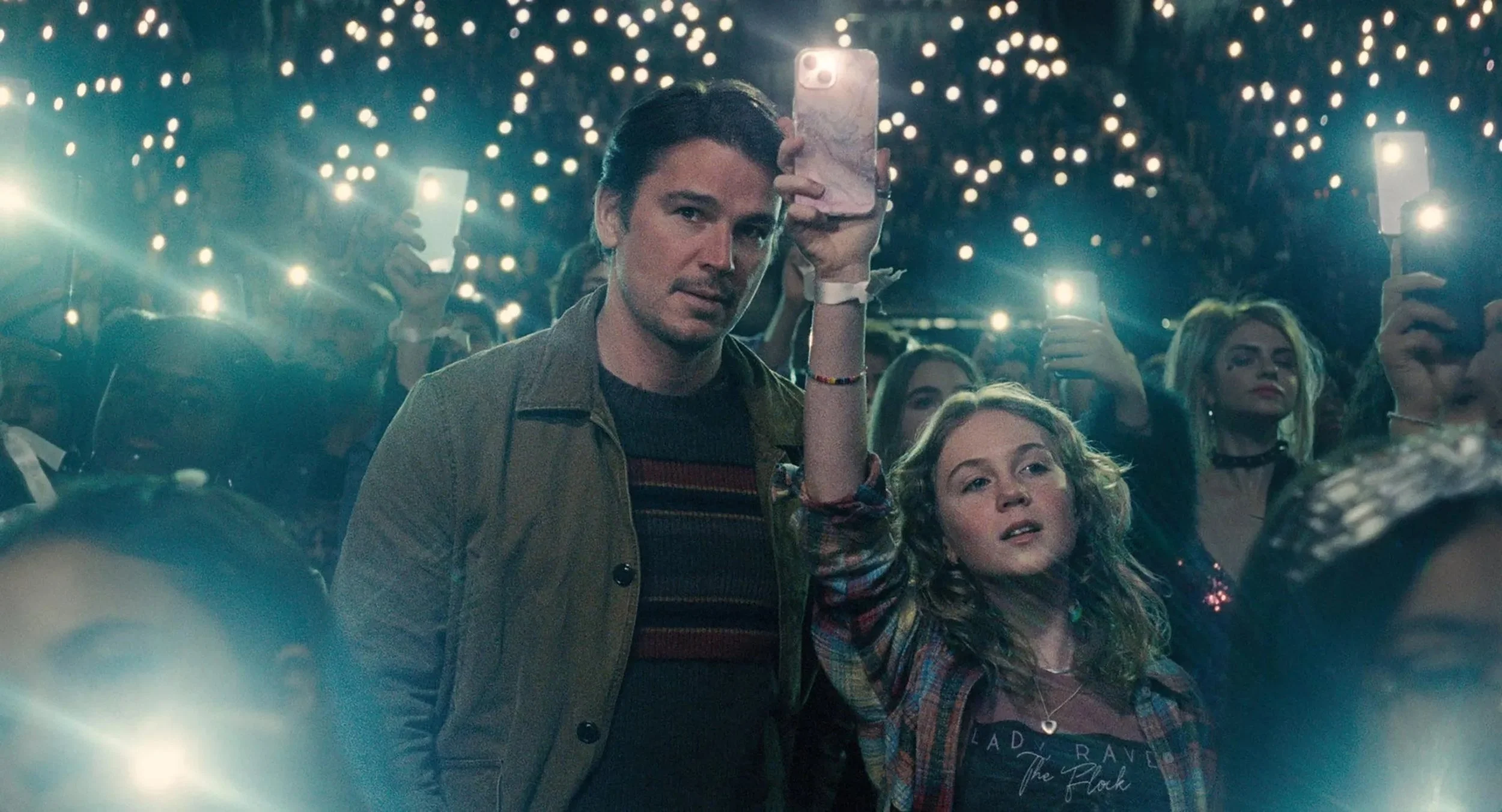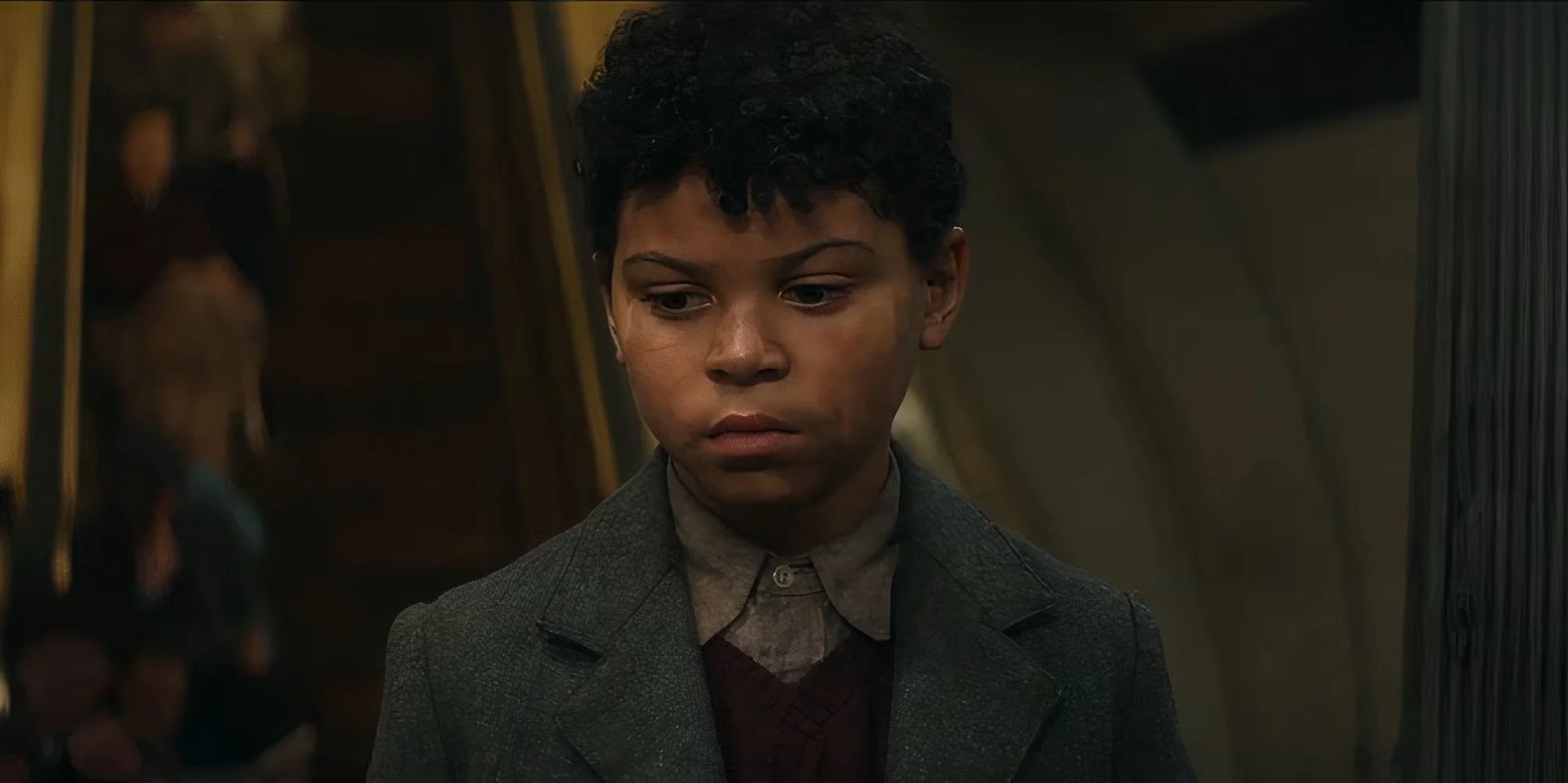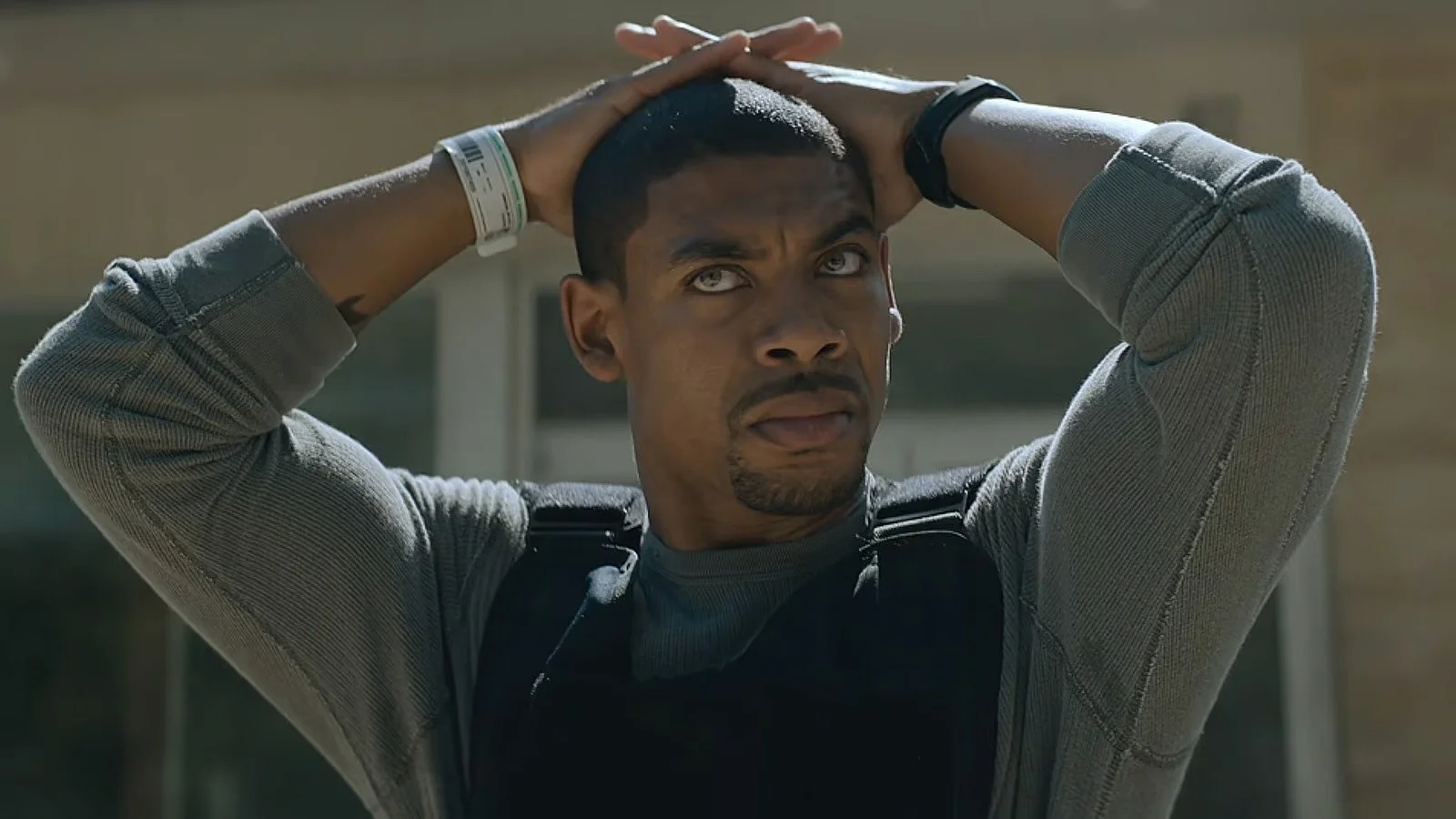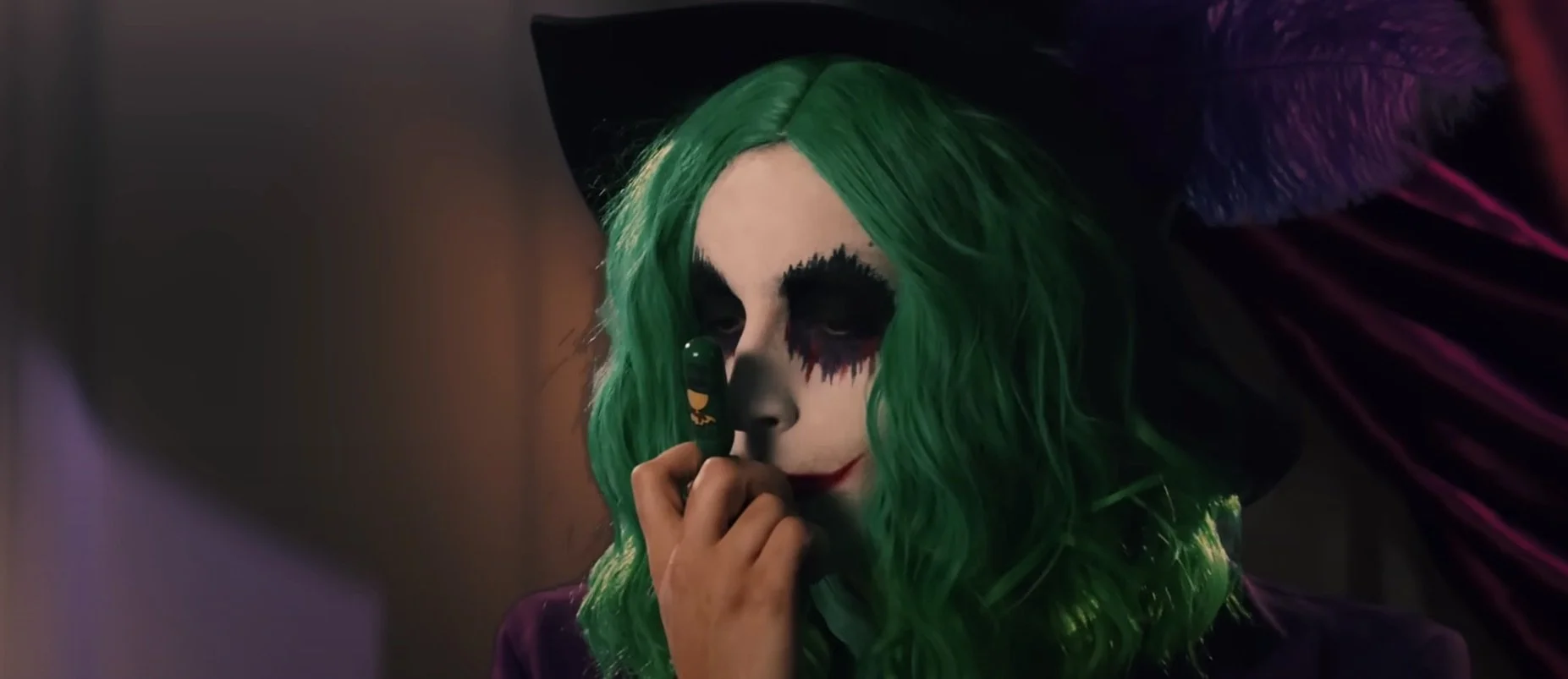Best of 2024: William Bibbiani’s Top 10 movies
by William Bibbiani, Staff Writer
OHMYGOD-THISARTICLEWENTWAYOVERTHEWORDCOUNT-NOTIMEFORINTRODUCTIONS-IT’SBEENAGREATYEARFORCINEMA-YADDAYADDA-LET’SGOOOOOOOO
10. Trap (dir. M. Night Shyamalan)
Sam Raimi’s Evil Dead and Chuck Jones’s Duck Amuck are two self-aware masterpieces about filmmakers waging war against their own creations, nightmare worlds in which any horror that can possibly be inflicted on their so-called “hero” not only will happen, it must happen, because the goal is to shatter their sanity. M. Night Shyamalan’s wily Trap is the exact opposite. The writer/director’s role is that of a prankster god who deems one serial killer, played by a weird Josh Hartnett, worthy of inexplicable favor. He’s cornered at a sold-out concert with his oblivious teenage daughter (Ariel Donoghue). It’s secretly a police sting operation, but even though he’s impossibly screwed he can seemingly do no wrong. Fate conspires to protect this evil sack of crap, preserving his sanity while fraying the mental state of the audience. We hate this guy but we can only marvel at his ingenuity and luck, and wonder how the heck he’s going to get away with it this time. It’s only a small stretch to call Trap a commentary on Donald Trump, since it’s about a smiling ghoul who fails perpetually upwards, but whether you buy that or not it’s a smart and fiendishly witty meditation on the power of narrative contrivance.
9. Blitz (dir. Steve McQueen)
There may have been better movies in 2024 than Steve McQueen’s World War II drama Blitz, but I’m not convinced that there were any movies with more, for lack of a better word, “movie.” McQueen’s vibrant epic tells the tale of Rita, a single mother played by Saoirse Ronan, who sends her son George (Elliott Heffernan) to the countryside to protect him from German bombings in London. Feeling betrayed, George’s last words to his mother are venomously hateful, but he feels terrible about it so he soon leaps off the train and ventures his way home. George’s journey is through a harrowed and fraught country, and also through a history of classic literature and cinema. McQueen sends George across pro-British 1940s propaganda films like Mrs. Miniver, through an Oliver Twist-ian criminal underground, and headlong into gigantic disaster epics like W.S. Van Dyke’s San Francisco. It’s a masterful pastiche, and endlessly watchable, but McQueen isn’t content to just snare our senses. He uses these familiar frameworks to tell a brand new story about the People of Color who were almost completely ignored by those original works, recontextualizing a legacy of historical melodrama and making it powerfully distinct from all that came before.
8. Seeking Mavis Beacon (dir. Jazmin Renée Jones)
A particularly excellent year for documentaries, 2024 gave us hard-hitting topical firebrands like Zurawski v. Texas, No Other Land, Porcelain War and many more besides, but Seeking Mavis Beacon is one of the two that really stood out. (We’ll get to the other one.) Jazmin Renée Jones and McKayla Ross embark on a quest to find Mavis Beacon, one of the first Black icons in computer software, who taught an entire generation how to type and introduced them to a new, technological world which would go on to define the turn of the century and transform both passions and employment. The problem is, Mavis Beacon didn’t actually exist. What they uncover is that the story of Mavis Beacon is not as empowering as they believed, with uncomfortable parallels with their own experiences in computer sciences, since their future careers are suddenly jeopardized by—ironically—their very commitment to documenting that the history of the field. Deeply personal and quietly radical, Seeking Mavis Beacon finds its own voice, and its own strength.
7. Red Rooms (dir. Pascal Plante)
I can think of no film more disturbing this year—a year with no shortage of cinematic disturbances—than Pascal Plante’s Red Rooms. It’s a picture about our obsession with moral vacuums, and that moral vacuum’s obsession with the rest of us. Juliette Gariépy plays Kelly-Anne, a successful fashion model who wakes up early every morning, just to attend the trial of an alleged snuff filmmaker. Plante’s Kubrickian camera, antiseptic and restrained, gives us no insight into her motives. Her actions have to speak for themselves. We become a voyeur, a detective, a jury, as we ponder the possibilities. Is she academically fascinated? Morbidly aroused? The killer’s accomplice? The answers we eventually receive are unsettling and leave us with haunted images, but it’s the questions we ask that give the film its disquieting significance. We judge her obsession, obsessively, inviting that same judgment upon ourselves. Red Rooms is a film that’s watching itself, an infinite mirror leading nowhere, or perhaps to our enlightenment, or to an abyss.
6. Rebel Ridge (dir. Jeremy Saulnier)
If you told me one of the most pulse-pounding movies of the decade would be about civil asset forfeiture, I’d probably have said “Yeah, that tracks.” Jeremy Saulnier’s Rebel Ridge begins with corrupt cops hitting a bicyclist, Terry (Aaron Pierre), with their car and then — legally — stealing all of his money. Terry was racing to bail his cousin out of jail, but now they’re both trapped in a bureaucracy, enforced by generations of entrenched racism, with his cousin’s safety on the line. It’s an uphill, Herculean battle and just when you think it’s over, and you’re catching your breath because of how intense it was, you realize you’ve still got half of this riveting movie to go. Saulnier equates the conventions of the classical Hollywood thriller with the Kafkaesque persecutions of the 21st century, making us all feel helpless. But he also gives us one of the great modern movie heroes, a man determined to do the right thing, the right way, until he runs out of options. Then he’ll do the right thing by any means possible. It’s the (mostly) plausible version of David Ayer’s The Beekeeper — a film that was no less pointed or satisfying for being ridiculous — but Rebel Ridge has more character, more insight, and more fury.
5. The Wild Robot (dir. Chris Sanders)
Many modern animated films, the big expensive CGI ones from American studios at least, are the cinematic equivalent of jingling your keys in front of a baby. Pleasing distractions with no meaningful meaning, and extremely annoying if they go on too long. Chris Sanders came to the rescue this year with The Wild Robot, a captivating adaptation of Peter Brown’s 2016 novel, about a high-tech automaton who lives to serve, but has no humans to tell it what to do. Stranded in the woods, it’s forced to come up with its own purpose, at first quite literally and soon on a deeper level. The Wild Robot follows ROZ (Lupita Nyong’o) as she raises a gosling she accidentally orphaned, discovering the joys of motherhood, and spring boarding off of that experience into spiritual enlightenment, finally becoming a messianic figure to the fauna that initially hated and feared her. It’s a heavy-handed plot outline, but it’s executed with incredible grace and a dark sense of humor, which keeps The Wild Robot from dipping too deeply into the saccharine. This stunning epic earns all its tears, earns all its messages, and earns its place in the American animated canon.
4. The Spectacular Failure of the Star Wars Hotel (dir. Jenny Nicholson)
The greatest cinematic villain of 2024 was an inconveniently-placed pole. Jenny Nicholson’s Homeric four-hour chronicle of corporate ineptitude and stymied, earnest fandom blurs the line between YouTube essay and personal documentary, revealing the filmmaker’s successful attempt to visit — and unsuccessful attempt to enjoy—the short-lived Star Wars: Galactic Starcruiser hotel at Disney World. Envisioned as a premium vacation experience, where customers could not only live on a Star Wars spaceship but interact with a multifaceted, in-universe narrative, the Galactic Starcruiser was actually a testament to the ongoing, losing conflict between artistic ambition and capitalistic compromise. Nicholson lays out in painstaking and comical detail the many practical and creative decisions that canceled each other out, laying bare capitalism’s failure to not only serve the art it exploits, but also its failure to serve itself, torpedoing its own capacity for long-term success for the sake of short-lived mediocre windfalls, where your consumers can pay out the nose for seats to a show, only to discover that the room and their table were designed to ruin the experience by completely obstructing their view. The 21st century is an oppressive hellscape of corporate control and incompetence, and the opiates they’re issuing to the masses are dissolving in front of our eyes.
3. The Seed of the Sacred Fig (dir. Mohammad Rasoulof)
Mohammad Rasoulof is living in exile right now, after filming The Seed of the Sacred Fig—an electric political thriller, intensely critical of the Iranian government—in secret. How he managed to pull off a car chase under those conditions, I will never fathom. Missagh Zareh stars as Iman, a husband and father with a new job investigating Iranian citizens for crimes against the government, or god, or whatever else he’s told to investigate (read: find them guilty) for. He’s given a gun to protect himself, but in the midst of a widespread political youth protest the weapon goes missing, and his paranoid eye turns towards his own wife and teenage daughters. The Seed of the Sacred Fig is a film about insidious ideologies, and how they bleed into every facet of our lives when they go unquestioned. The film escalates in tension, in power, in terror, until a climax that in a shorter, less purposeful film might feel a little over the top. But in this bitter, angry drama Rasoulof earns every plot point, every reversal, every single minute of runtime. Political cinema doesn’t get much more dangerous, on screen or—sadly—in real life.
2. The People’s Joker (dir. Vera Drew)
There was no film more punk rock in 2024. Or 2023. Or 2022. Or 2021. I could go on like this. Vera Drew’s renegade superhero movie—about a dystopian world where Batman runs a corporate media empire and the only humor allowed by law is on, functionally, Saturday Night Live—stars Drew herself as an aspiring comedian, huffing her prescription Smilex gas to suppress her emotions and mask her trans identity. When she teams up with her fellow outlaw artists, deemed villains by a society that hates and fears outsiders, she evolves into the greatest of all counterculture icons. The People’s Joker doesn’t hide behind thin allegories, it cuts right to the jugular of mainstream studio bullshit, declaring itself the real deal, the characters exactly who they are, legal complications be damned. Drew transforms the language of a suppressive culture into the language of rebellion, finding deeper meaning in characters and concepts whose owners, and fans, have too long taken them for granted. Vera Drew’s film isn’t just great cinema, it’s a heist in broad daylight, and she gets away with it like the greatest of all criminal masterminds.
1. I Saw the TV Glow (dir. Jane Schoenbrun)
I don’t much care for hyperbole, at least not in print, so I’m going to put this as mildly as I possibly can: As of right now, the end of the year in 2024, I Saw the TV Glow is the best film of the decade. Its closest competition, We’re All Going to the World’s Fair, just happens to have also been directed by Jane Schoenbrun. Her films are queer coming of age stories, filtered through the screens that their protagonists are growing up with. In World’s Fair the screen is a pathway to DIY filmmaking and Creepypastas, in I Saw the TV Glow it’s half-remembered nostalgia television, but in both cases those screens stare back at you. Justice Smith and Brigitte Lundy-Paine star as Owen and Maddy, teenagers who escape their unwanted realities by obsessing over their favorite show, a very Buffy-esque teen horror series called The Pink Opaque. Years go by, Maddy disappears and leaves Owen alone in his small town and small life, until she returns with a revelation that could change Owen’s life forever. The horrifying thought isn’t that what Maddy says might be real, it’s that Owen’s egg might never crack, and he’ll never live the life he could have lived. Ethereal yet astoundingly specific, a metaphor for coming of age as a trans (and arguably asexual) youth, I Saw the TV Glow finds profundity in the damnedest places, the art that we identify with as youths but do not fully understand, the thin transparent veil between our miserable lives and the lives we think we’d do anything to experience instead — but often, for heartbreaking reasons, actually do anything to avoid. I Saw the TV Glow is, like much of the great trans cinema this year (The People’s Joker, Louise Weard’s Castration Movie, arguably Transformers: One if you really want to go there), redefining the language and possibilities of cinema, quite probably — and indeed, quite hopefully — forever.
I also loved (in alphabetical order):
The Best Christmas Pageant Ever (dir. Dallas Jenkins)
Better Man (dir. Michael Gracey)
Between the Temples (dir. Nathan Silver)
castration movie anthology i. traps (dir. Louise Weard)
Exhibiting Forgiveness (dir. Titus Kaphar)
Fly Me to the Moon (dir. Greg Berlanti)
Mars Express (dir. Jérémie Périn)
Oddity (dir. Damian Mc Carthy)
The Parts of Megalopolis With Aubrey Plaza in It (dir. Francis Ford Coppola)
A Real Pain (dir. Jesse Einsenberg)
Smile 2 (dir. Parker Finn)
Under Paris (dir. Xavier Gens)
Zurawski v. Texas (dirs. Maisie Crow & Abbie Perrault)
I also liked these ones a lot (in completely random order):
Sing Sing (dir. Greg Kwedar)
In a Violent Nature (dir. Chris Nash)
Challengers (dir. Luca Guadagnino)
1922 (dir. Ariel Vroman)
A Different Man (dir. Aaron Schimberg)
The Substance (dir. Coralie Fargeat)
Evil Does Not Exist (dir. Ryusuke Hamaguchi)
The Fall Guy (dir. David Leitch)
Conclave (dir. Edward Berger)
Kneecap (dir. Rich Peppiatt)
Ghostlight (dirs. Kelly O’Sullivan and Alex Thompson)
Horizon: An American Saga - Part 1 (dir. Kevin Costner)
…and many more!













